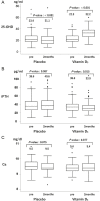Randomized Trial of Vitamin D Supplementation to Prevent Seasonal Influenza and Upper Respiratory Infection in Patients With Inflammatory Bowel Disease
- PMID: 30601999
- PMCID: PMC6499936
- DOI: 10.1093/ibd/izy346
Randomized Trial of Vitamin D Supplementation to Prevent Seasonal Influenza and Upper Respiratory Infection in Patients With Inflammatory Bowel Disease
Abstract
Background: We evaluated whether oral vitamin D supplementation during the winter and early spring reduces the incidence of influenza and upper respiratory infections in patients with inflammatory bowel disease (IBD).
Methods: A randomized, double-blind, controlled trial was conducted to compare the effects of vitamin D supplementation (500 IU/day) and a placebo. The primary outcome was the incidence of influenza; the secondary outcome was the incidence of upper respiratory infection. Prespecified subgroup analyses were performed according to 25-hydroxyvitamin D (25-OHD) levels (low <20 ng/mL or high ≥20 ng/mL) and whether ulcerative colitis (UC) or Crohn's disease (CD) was present. We also used the Lichtiger clinical activity index for patients with UC and the Crohn's Disease Activity Index (CDAI) for patients with CD before and after interventions.
Results: We included 223 patients with IBD and randomized them into 2 groups: vitamin D supplementation (n = 108) and placebo (n = 115). The incidence of influenza did not differ between the groups. However, the incidence of upper respiratory infection was significantly lower in the vitamin D group (relative risk [RR], 0.59; 95% confidence interval (CI), 0.35-0.98; P = 0.042). This effect was enhanced in the low 25-OHD level subgroup (RR, 0.36; 95% CI, 0.14-0.90; P = 0.02). With respect to adverse events, the Lichtiger clinical activity index score was significantly worse in the vitamin D group (P = 0.002) and remained significant only in the high 25-OHD level subgroup.
Conclusions: Vitamin D supplementation may have a preventative effect against upper respiratory infection in patients with IBD but may worsen the symptoms of UC.
Keywords: Crohn’s disease; ulcerative colitis; vitamin D3 supplementation.
© 2019 Crohn’s & Colitis Foundation. Published by Oxford University Press on behalf of Crohn’s & Colitis Foundation.
Figures
References
-
- Holick MF. Vitamin D deficiency. N Engl J Med. 2007;357:266–281. - PubMed
-
- de Boer IH, Ioannou GN, Kestenbaum B, et al. . 25-hydroxyvitamin D levels and albuminuria in the third national health and nutrition examination survey (NHANES III). Am J Kidney Dis. 2007;50:69–77. - PubMed
-
- Doorenbos CR, van den Born J, Navis G, et al. . Possible renoprotection by vitamin D in chronic renal disease: beyond mineral metabolism. Nat Rev Nephrol. 2009;5:691–700. - PubMed
Publication types
MeSH terms
Substances
LinkOut - more resources
Full Text Sources
Medical



